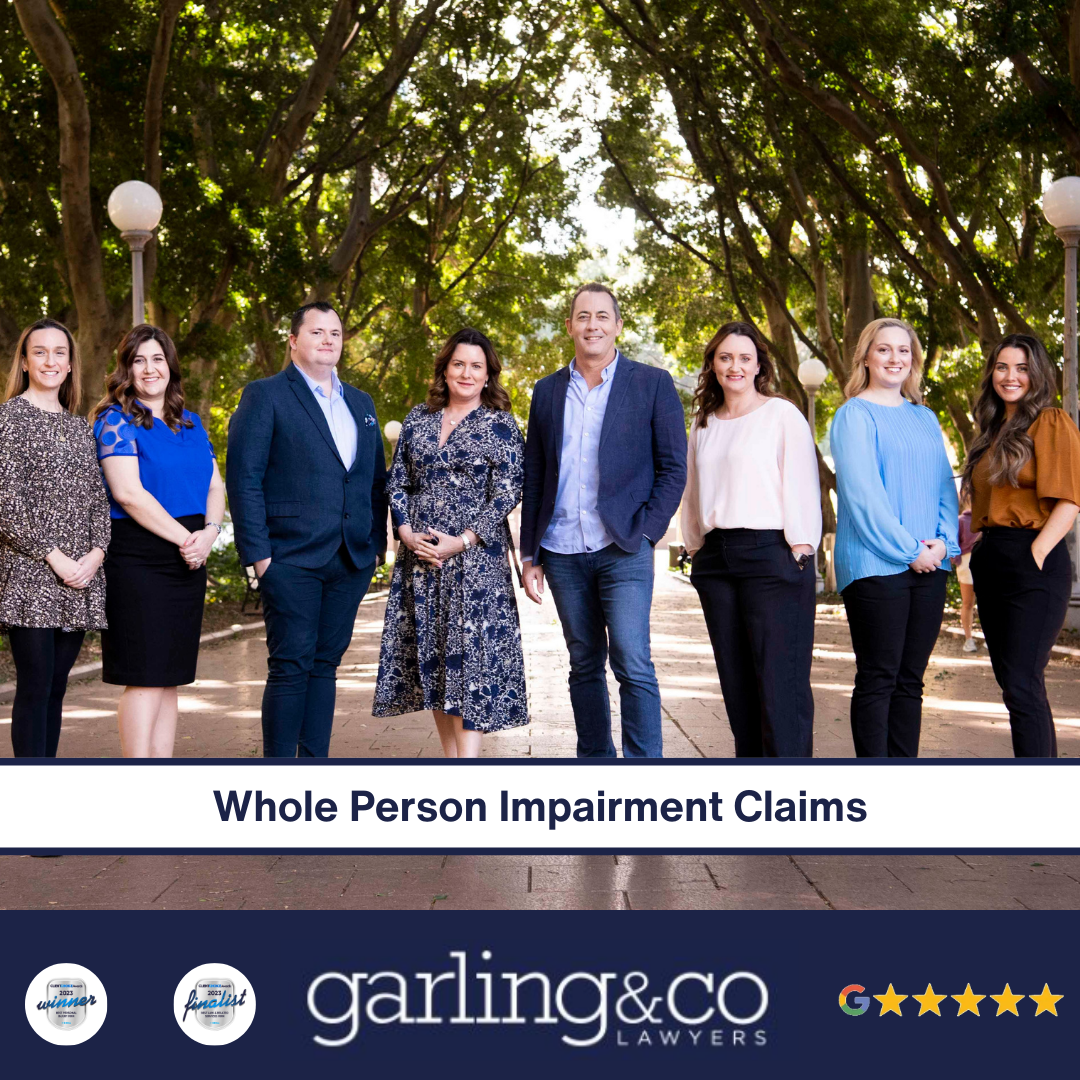"*" indicates required fields

There is no charge for your initial appointment and we do not charge you to take instructions from you. In this appointment, we will determine if we can assist in your claim and our firm's role should you instruct us to act on your behalf.
What is permanent impairment?
Permanent Impairment is the term used to describe the lasting effect that an injury has on your daily functioning. This type of injury can be physical and/or psychological.
What is whole person impairment and why is it important?
Whole Person Impairment (WPI) is the measurement used to assess your permanent impairment. It is expressed as a percentage of how much permanent damage the injury has caused to your body.
Making a WPI claim is extremely important. In NSW, without a WPI assessment, an injured worker is only entitled to a maximum of five years’ worth of weekly payments and medical expenses. For example, if your WPI is assessed at 21% or above, you are entitled to payment of weekly payments until one year after your statutory retirement age and payment of medical expenses for life.
How is whole person impairment calculated in NSW?
WPI is calculated in NSW using a percentage system to try and scale injuries according to their seriousness. The rating determines the WPI payout amount, which is a lump sum payment that compensates you for the effect the work injury has had on your life. If your WPI is 11% or higher (15% or higher for a psychological injury), you are entitled to a lump sum amount of compensation. This lump sum claim is in addition to any weekly payments and medical expenses that you are already entitled to.
What is a whole person impairment scale/rating?
Whole Personal Impairment is the method used to assess the permanent impairment. The medical assessor will clinically assess an injured worker to determine the % whole personal impairment that will be applied due to the injury.
| Injury | Impairment rating |
| Fusion or Disc Surgery to the Lumbar Spine | 21 – 25% |
| Fusion or Disc Surgery to the Cervical Sine | 25 – 28% |
| Shoulder – loss of range of motion | 25 – 8% |
| Hip Replacement | 15 – 30% |
Whole Person Impairment Table NSW 2024-2025
| Impairment rating range | Whole person impairment payout range |
| 11% to 21% | $22,480 to $66,540 |
| 22% to 31% | $54,820 to $106,540 |
| 32% and over | $87,880 up to $740,550 |
What is the process for making a whole person impairment claim?
In order to make a WPI claim in NSW there are several steps that you must follow. Your lawyer will help you along the way, and that is why it is extremely important to get in touch with one if you think you may have a claim. Outlined below are the steps that you will take on your way to a lump sum payment for whole person impairment.
How do I qualify for a whole person impairment claim?
To qualify for a WPI claim, you’ll need a medical assessment from a SIRA certified doctor for two reasons:
- To assess whether your compensable injury has reached a level of maximum medical improvement. A compensable injury refers to an injury that arises out of or in the course of your employment. Maximum medical improvement means that your injury is unlikely to change within the next 12 months. This usually does not occur until at least one year following the injury once all surgery has been completed, however, each case is different.
- To assess whether your injury has resulted in a permanent impairment of at least 10%.
Here are the steps you’ll need to take to qualify for a whole person impairment claim:
- The first, and most crucial, step is to contact a lawyer who is an accredited specialist. All lawyers at Garling and Co are accredited specialists.
- Once your injury has stabilised and reached maximum medical improvement, your lawyer will refer you to a medico-legal doctor who assesses your level of permanent impairment. If your injury is not at this stage yet, be patient. The doctor will not be able to assess you until your injury will not heal any further. Learn more about how doctors assess the level of WPI for spinal injury claims here.
- The medico-legal doctor will assess your level of impairment based on the AMA permanent impairment assessment guidelines. They will assess whether your condition is stable and if your impairment is permanent.
- If the doctor assesses you as above 11% for a physical injury, and 15% for a psychological injury, notify your lawyer. They will assist you in submitting a claim to your workers compensation insurer.
How do I make the claim for whole person impairment?
- Get in touch with an accredited specialist lawyer to assist you with making the claim. Your level of permanent impairment must have been assessed to be higher than 11% for a physical injury, or 15% for a psychological injury. Your lawyer will assist you with making the claim to your workers compensation insurer.
- Your insurer will review your claim and decide whether to accept or reject it. If your claim is accepted, you will be entitled to a lump sum payment based on your level of WPI. If your claim is rejected do not get disheartened. It is very common that WPI claims are rejected by insurers. An accredited specialist is used to disputing and appealing these decisions, and at Garling and Co, all of our lawyers are accredited specialists.
- If your claim is rejected, the Personal Injury Commission will appoint an Independent doctor who will assess your level of WPI.
Some additional tips to keep in mind when making a WPI claim.
- You can only make one claim for permanent impairment.
- You must have a WPI of 15% or more to make a negligence claim.
- You must have a WPI of 21% or more to receive weekly payments for longer than 5 years.
Garling & Co Lawyers’ top tips for making a whole person impairment claim
Here are some tips that may be useful when making a claim for WPI.
- Keep good records of your injury. This includes medical records, rehabilitation records and any other documentation that supports your claim.
- Be persistent. The claim process is lengthy. It often takes multiple years to conclude. Do not get discouraged if you feel as though your claim is not being completed.
- Do not give up. If your claim is denied and you have a good case, you should appeal the decision.
- Stay patient. Some injuries can take years to stabilise. Most cases you will have to wait at least a year before your injuries can be assessed, as they have not reached maximum medical improvement.
FAQ
What are the differences between the lump sum payment and weekly payments?
A lump sum payment is the amount of money you can claim for a percentage of whole person impairment. Weekly payments are payments that you receive from your insurer, usually from the date of your injury to cover any wage loss. Such payments are made fortnightly into your bank account.
Does the whole person impairment assessment affect any claim for negligence against my employer?
Yes, you will need to reach a WPI of at least 15% to make a work injury damages claim for negligence against your employer.
Can psychologists assess whole person impairment?
No, only SIRA approved psychiatrists can assess permanent impairment for WPI claims.
Thank you for reading our article. We hope it helped your understanding of Whole Person Impairment. Should you have any further questions, please contact our office at (02) 8329 9500 or complete a free case assessment here.












